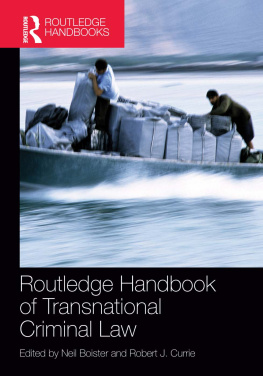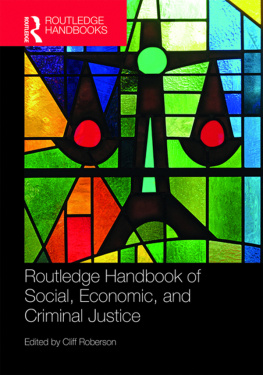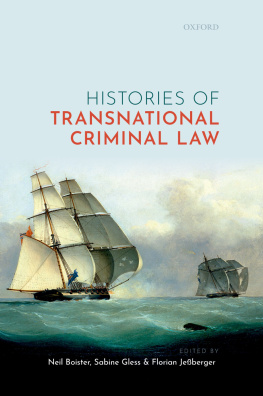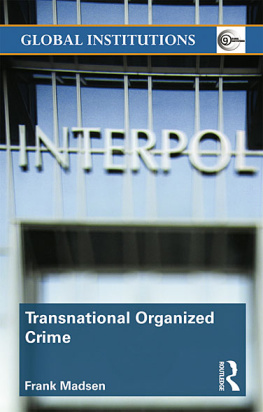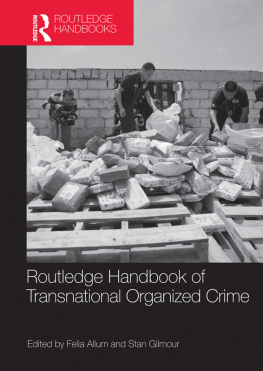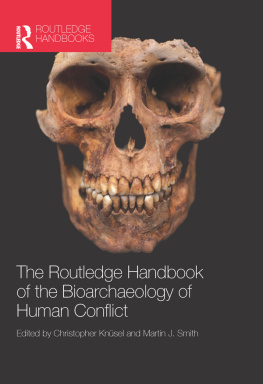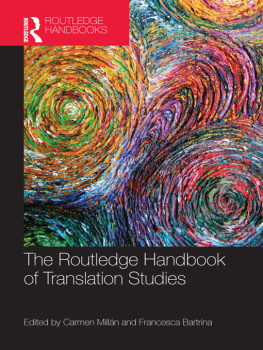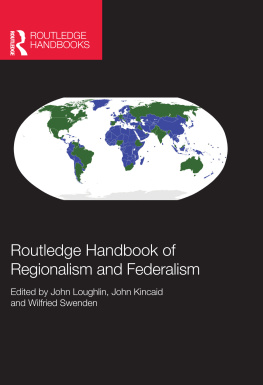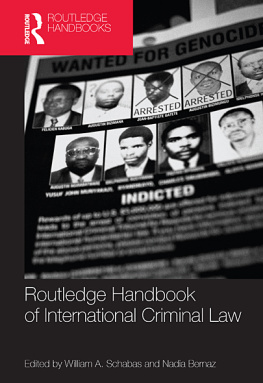Neil Boister - Routledge Handbook of Transnational Criminal Law
Here you can read online Neil Boister - Routledge Handbook of Transnational Criminal Law full text of the book (entire story) in english for free. Download pdf and epub, get meaning, cover and reviews about this ebook. publisher: Taylor and Francis, genre: Home and family. Description of the work, (preface) as well as reviews are available. Best literature library LitArk.com created for fans of good reading and offers a wide selection of genres:
Romance novel
Science fiction
Adventure
Detective
Science
History
Home and family
Prose
Art
Politics
Computer
Non-fiction
Religion
Business
Children
Humor
Choose a favorite category and find really read worthwhile books. Enjoy immersion in the world of imagination, feel the emotions of the characters or learn something new for yourself, make an fascinating discovery.
- Book:Routledge Handbook of Transnational Criminal Law
- Author:
- Publisher:Taylor and Francis
- Genre:
- Rating:4 / 5
- Favourites:Add to favourites
- Your mark:
- 80
- 1
- 2
- 3
- 4
- 5
Routledge Handbook of Transnational Criminal Law: summary, description and annotation
We offer to read an annotation, description, summary or preface (depends on what the author of the book "Routledge Handbook of Transnational Criminal Law" wrote himself). If you haven't found the necessary information about the book — write in the comments, we will try to find it.
Routledge Handbook of Transnational Criminal Law — read online for free the complete book (whole text) full work
Below is the text of the book, divided by pages. System saving the place of the last page read, allows you to conveniently read the book "Routledge Handbook of Transnational Criminal Law" online for free, without having to search again every time where you left off. Put a bookmark, and you can go to the page where you finished reading at any time.
Font size:
Interval:
Bookmark:

Routledge Handbook of Transnational Criminal Law
Certain types of crime are increasingly perpetrated across national borders and require a unified regional or global response to combat them. Transnational criminal law covers both the international treaty obligations which require states to introduce specific substantive measures into their domestic criminal law schemes, and an allied procedural dimension concerned with the articulation of inter-state cooperation in pursuit of the alleged transnational criminal.
The Routledge Handbook of Transnational Criminal Law provides a comprehensive overview of the system which is designed to regulate cross-border crime. The book looks at the history and development of the system, asking questions as to the principal purpose and effectiveness of transnational criminal law as it currently stands. The book brings together experts in the field, both scholars and practitioners, in order to offer original and forward-looking analyses of the key elements of the transnational criminal law.
The book is split into several parts for ease of reference:
, fundamental concepts surrounding the international regulation of transnational crime.
, procedures for international cooperation against alleged transnational criminals including jurisdiction, police cooperation, asset recovery and extradition.
, substantive crimes covered by transnational criminal law analysing the current legal provisions for each crime.
, the implementation of transnational criminal law and the effectiveness of the system of transnational criminal law.
With chapters from over 25 authorities in the field, this handbook will be an invaluable reference work for students and academics and for policy makers with an interest in transnational criminal law.
Neil Boister is a Professor at the University of Waikato, New Zealand and is the author of An Introduction to Transnational Criminal Law (2012).
Robert J. Currie is Associate Professor at the Schulich School of Law, Dalhousie University, Canada and is the co-author (with Joseph Rikhof) of International and Transnational Criminal Law 2ed (2013).
This handbook is a very timely and important contribution to the literature on transnational crime, covering key dimensions of this emerging area of law and policy. Both jurisdictional and procedural aspects of the topic are covered as well as aspects of its implementation in global, regional and domestic state practice. Incisive analysis from leading scholars and practitioners in the field of transnational criminal law combine to make this an invaluable reference.
Dr Robin Warner, Australian National Centre for Ocean Resources and Security (ANCORS), University of Wollongong, Australia
Routledge Handbook of Transnational Criminal Law
Edited by Neil Boister and Robert J. Currie

First published 2015
by Routledge
2 Park Square, Milton Park, Abingdon, Oxon, OX14 4RN
and by Routledge
711 Third Avenue, New York, NY 10017
Routledge is an imprint of the Taylor & Francis Group, an informa business
2015 selection of editorial material, Neil Boister and Robert J. Currie; individual chapters, the contributors
The right of Neil Boister and Robert J. Currie to be identified as editors of this work has been asserted by them in accordance with sections 77 and 78 of the Copyright, Designs and Patents Act 1988.
All rights reserved. No part of this book may be reprinted or reproduced or utilised in any form or by any electronic, mechanical, or other means, now known or hereafter invented, including photocopying and recording, or in any information storage or retrieval system, without permission in writing from the publishers.
Trademark notice: Product or corporate names may be trademarks or registered trademarks, and are used only for identification and explanation without intent to infringe.
British Library Cataloguing in Publication Data
A catalogue record for this book is available from the British Library
Library of Congress Cataloging-in-Publication Data
A catalog record has been requested for this book
ISBN: 978-0-415-83712-5 (hbk)
ISBN: 978-0-203-38027-7 (ebk)
Typeset in Bembo
by RefineCatch Limited, Bungay, Suffolk
Contents
Neil Boister and Robert J. Currie
Neil Boister
Robert J. Currie
James Sheptycki
Slawomir Redo
Valsamis Mitsilegas
Roger S. Clark
Saskia Hufnagel and Carole McCartney
John A.E. Vervaele
Charles Monteith and Pedro Gomes Pereira
Joanna Harrington
Tom Obokata
Anne T. Gallagher
Lindsay Buckingham
Bernard Leroy
Catherine E. Drummond and Anthony E. Cassimatis
Arianna Visconti
Rob White
Jay L. Batongbacal
Henning Grosse Ruse-Khan
William Gilmore
John Hatchard
Douglas Guilfoyle
Christopher Ram
Ben Saul
Andreas Schloenhardt
Yvon Dandurand and Vivienne Chin
Jay L. Batongbacal is a lawyer from the Philippines, and holds the degrees of Master of Marine Management and Doctor in Jurisprudential Science, both from Dalhousie University in Canada. Since 1997, he has done work in maritime affairs, including community-based fisheries management, coastal resource management, marine environment protection, maritime boundaries, high seas fishing, offshore energy, seafaring and shipping. He was legal advisor to the Philippine delegation that successfully pursued the Philippines claim to a continental shelf beyond 200 nautical miles in the Benham Rise Region before the Commission on the Limits of the Continental Shelf. He is presently an Assistant Professor at the University of the Philippines College of Law, and concurrently Director of the Institute for Maritime Affairs and Law of the Sea of the U.P. Law Center.
Neil Boister is Professor in the Te Piringa Faculty of Law, University of Waikato, New Zealand. A graduate of the universities of Natal and Nottingham, he has held academic positions in South Africa, the UK and New Zealand, where he has taught transnational criminal law, international criminal law, criminal law, evidence and criminology. His principal research interest is the suppression of transnational crime through international law. His PhD from the University of Nottingham resulted in the publication of Penal Aspects of the UN Drug Conventions (Kluwer, 2001). He has written numerous pieces exploring transnational criminal law more generally beginning with Transnational Criminal Law? (2003) 14(5) European Journal of International Law 953976. In 2012 he published An Introduction to Transnational Criminal Law (OUP). He works as a consultant on issues in transnational criminal law. In 2014 he was awarded a Friedrich Wilhelm Bessel Research Award by the Humboldt Foundation in Germany in recognition of his work in this field.
Lindsay Buckingham is currently a Principal Legal Officer with the Transnational Crime and Corruption Branch, Australian Government Attorney-Generals Department. Within the Australian Government she has worked across a range of transnational crime law and policy issues, including leading Australias engagement in mechanisms under the United Nations criminal justice system, and delivering technical assistance programs to support partner countries implementation of transnational crime obligations under international legal instruments. She has also worked as a Solicitor with the Child Protection Practice Group of the New South Wales Crown Solicitors Office. Lindsay has previously worked as a consultant on child sex tourism, trafficking in persons and migrant smuggling projects with the United Nations Office on Drugs and Crime, Regional Centre for East Asia and the Pacific, and with the International Labour Organizations Project to Combat Trafficking in Children and Women in the Greater Mekong Subregion. She holds a combined Bachelor of Arts and Laws (Hons) from Macquarie University, and a Master of Laws from the University of Sydney.
Next pageFont size:
Interval:
Bookmark:
Similar books «Routledge Handbook of Transnational Criminal Law»
Look at similar books to Routledge Handbook of Transnational Criminal Law. We have selected literature similar in name and meaning in the hope of providing readers with more options to find new, interesting, not yet read works.
Discussion, reviews of the book Routledge Handbook of Transnational Criminal Law and just readers' own opinions. Leave your comments, write what you think about the work, its meaning or the main characters. Specify what exactly you liked and what you didn't like, and why you think so.

